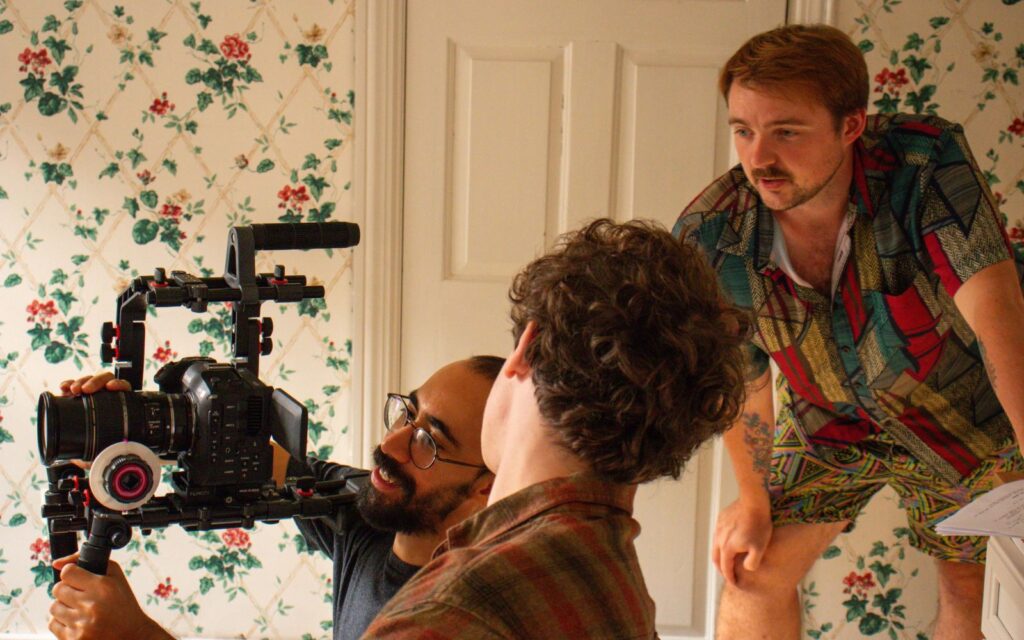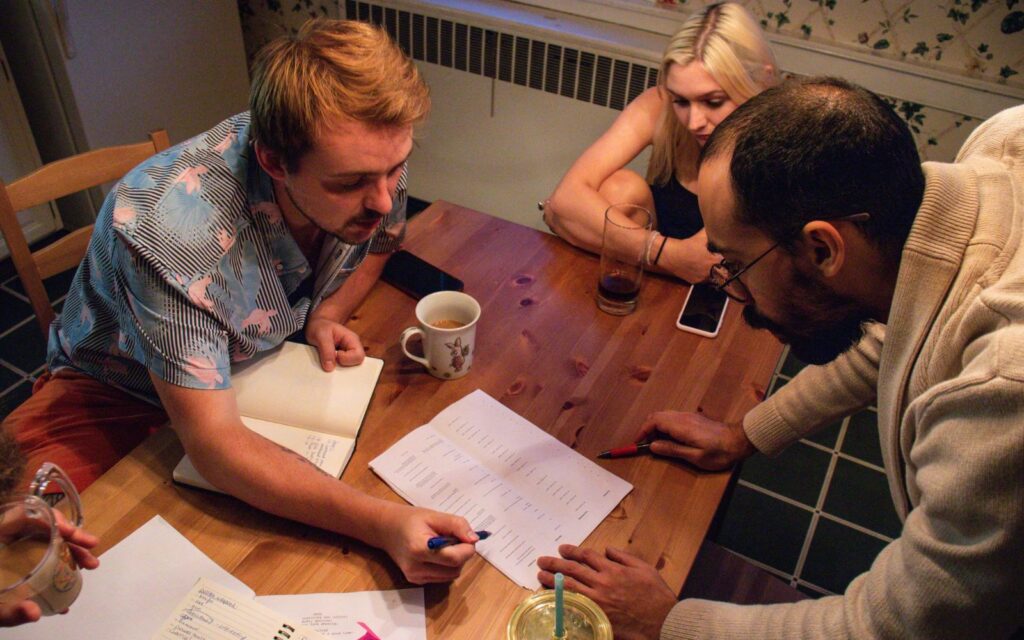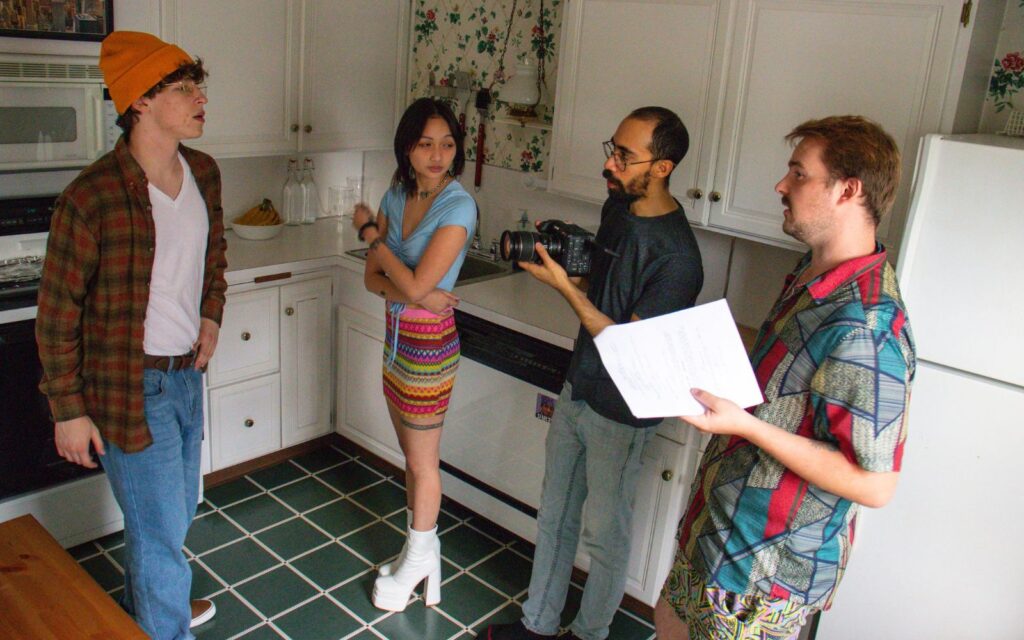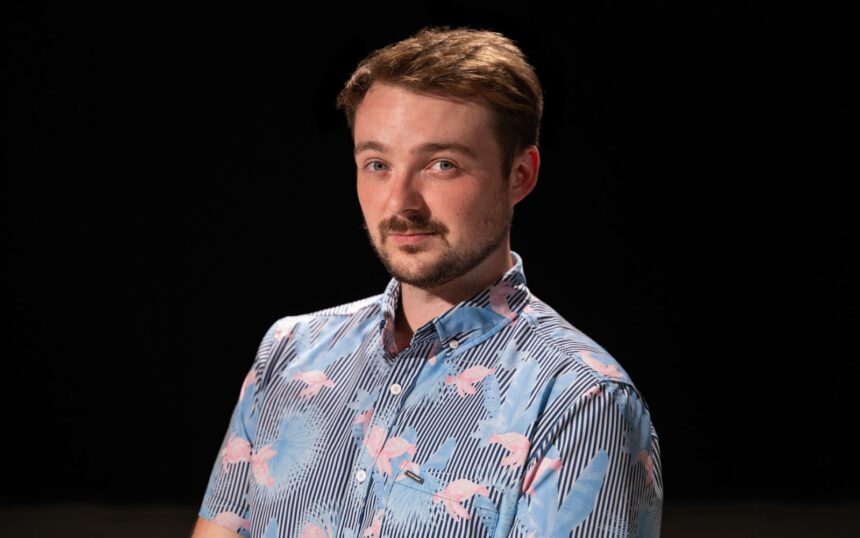I’m in an incredibly fortunate position where this was able to happen, and none of it would be happening without the support from everybody in my life helping to make this a reality.
Welcome to Hurwitz.TV’s Directors Interview Series, where we chat with some of the most influential filmmakers from all over the world.
In this series, you’ll have the opportunity to gain profound insights from the minds and creative journeys of these cinematic storytellers. Our goal is to explore the art of filmmaking, discover the inspirations and motivations that drive these directors, and delve into the captivating stories behind their remarkable works. From seasoned veterans to emerging talents, we talk about their artistic influences, memorable experiences, and the challenges they’ve faced along the way.
Today, I am joined by Pennsylvania-based director and screenwriter J.C. McKearnin, who just wrapped his debut short feature, “Body Count.” A romantic horror comedy, Body Count is the story of Delilah, a young female serial killer, and Paul, her true-crime obsessed boyfriend, who find their relationship at an impasse. The pair unexpectedly come together one fateful night and must decide if their relationship is worth dying (or killing) for.

Dennis: Thank you for joining us J.C.! To kick things off, can you tell us a little bit about yourself and your background?
J.C.: Thanks so much for having me! I’ve actually never given an interview before, so forgive me if I just ramble incoherently. In my head, I’ve given tons of interviews – but in reality, most of the time when somebody asks me a question, my mind goes blank, and I forget everything I’ve ever learned in my life. But a little about me – my name is J.C. McKearnin, I’m currently a Media Production student living in Pennsylvania, and I recently directed my first short film, Body Count. Body Count is a romantic horror comedy about Delilah (Rai Guatno), a serial killer who’s fallen in love with Paul (Andy Van Antwerp), her would-be next victim, and how they attempt to navigate that situation together.
Growing up, I was one of those kids who was always making a movie. My mom got me my first camera at age 12, and I was always forcing my friends and family to be in movies after that. The stories were usually pretty simple – there’s a killer on the loose and everybody’s in danger. We’d all be covered in ketchup by the end because I didn’t have fake blood, then I’d spend the night, still covered in ketchup, editing on Windows Movie Maker, and we’d all sit around and watch it the next day before coming up with the next idea.
Unfortunately, all those early projects of mine were lost over time, and I didn’t pick up a camera for almost 10 years after that. For a long time, those few years when I did make those little movies felt like a passing phase in my life that I’d never revisit. And then the crushing weight of mortality eventually set in: I realized I was about to turn 30, and I felt like I’d never accomplished anything, that I’d let myself down in so many ways…while also feeling that I was just one of millions of people with the same exact dream, and it would be pointless to try. Maybe it is, maybe it’s not. All I know right now is that, after all these years,
I’m in an incredibly fortunate position where this was able to happen, and none of it would be happening without the support from everybody in my life helping to make this a reality.
Dennis: Have you always wanted to be a filmmaker? What drove you to pursue this career path?
J.C.: Always. I don’t think there’s ever been another option for me, internally. I’ve never enjoyed any job I’ve had where I haven’t been able to do something creative – and I’ve probably never been the best employee because I was always fantasizing about making movies. I grew up in a big movie-watching household and for as long as I can remember, all I’ve ever wanted to do is tell stories in that way. That’s really what everything with Body Count has been about – expressing that creativity and proving to myself more than anybody else that this is something I can do.
Dennis: What was the greatest piece of advice given by a mentor that shaped the artist that you are today?
J.C.: Honestly, there’s no single piece of advice from one single person that I can say was the greatest. For me, it’s been more like…all of the people in my life have encouraged or supported me in some way along the way. Whether that was just talking me through a moment where I didn’t believe in myself, or where I felt like I had no direction in life, or just telling me that something I made was good. I’ve been fortunate enough to always have somebody, somewhere, to guide me in the direction that eventually led me to where I am now.

Dennis: Which movies and filmmakers inspired you the most?
J.C.: I find inspiration in everything I watch to some degree. The Scream films have played a major role in how I aspire to shape both scripts and characters. A lot of the films that inspired me for this project specifically are ones that blend genres in surprising ways. Ti West’s Pearl was another film I had in mind while writing this script. I think that film did such an incredible job of presenting us with this objectively horrible, evil person, but giving that character such a dimension that we come to love Pearl. Other films like Jennifer’s Body and Promising Young Woman also came to mind when I was shaping the central character of Delilah. I was drawn to the way those films depicted a woman who used her sexuality to gain the upper hand in situations and be in control of her surroundings. Those are some of the things I hoped to achieve in writing this character.
Another film I found myself thinking of was Julia Ducournau’s Titane – in that film, you have scenes of brutal violence that contrast with these very soft, character-driven moments that feel unexpectedly tender.
There’s also a lot of influence from romantic comedies in Body Count, especially in the sense that what’s often driving those plots are the classic tropes: simple miscommunications, clashing personalities, and the “will they/won’t they” aspect. The goal for Body Count was to poke fun at some of those tropes, while also using them as familiar ground in the story.
Dennis: What were the most challenging and rewarding parts of making a movie?
J.C.: The hardest part for me was to put my ideas into the hands of other people. I’m somebody who feels like I need to be in control of every aspect of something I’m doing, and it’s difficult for me to both ask for help and accept help when it’s offered. So, in working with this team on “Body Count,” it was a challenge for me to remind myself that this was something I couldn’t possibly do on my own and that it was necessary to trust the people around me, creatively and personally. Doing so led to some of the most rewarding aspects of watching this project come to life – because it wasn’t just my ideas, it was a collaborative effort where everybody on the team felt comfortable sharing their input, and I need to credit everybody for helping to shape what the project ultimately became. It was a great lesson in putting ego aside and having faith that the people you’re working with are working toward the same goal that you are, and that’s a lesson I intend to carry with me in future projects. On a simpler level, the most rewarding part of making a movie has been just that: making a movie. It’s been a lifelong dream of mine. I’ve had countless ideas for movies over the years, but it was never something I thought might happen one day. Even at this point – where it’s been shot and we’re nearing a final cut – it doesn’t feel real yet. Maybe it won’t feel real until people start seeing it. I’ll have to let you know.

Dennis: Let’s talk about your debut short feature, “Body Count.” What inspired you to write and direct this film? And what can audiences expect from this?
J.C.: Body Count actually began as a short script I had to write for a class, but I found myself coming back to these characters over and over again, and it eventually just became one of those things where everything falls into place at the right moment and we were able to put this together as a short film. The idea comes from a fascination I have with toxic relationships and how they’re portrayed in the media. What is it that draws two people together who are so wrong for each other, and what is it that makes them “work”
in a way that people love to watch? That’s a thought I’ve had while watching so many movies where the couple who are wrong for each other in every way somehow wind up together in the end. So, the idea for Delilah and Paul came from that thought of “What two people can I write that are so horrible for each other, and how can I write them in a way that somehow makes people root for them?” And from that, the serial killer and the true crime junkie who wants to be murdered were born. I also think we can all be toxic in our own ways, and it was so much fun to toy with those ideas for this script and turn them into something ridiculous. It was important to me that neither of them is made out to be any better or worse than the other – they’re both nuts. As for what people can expect, I just hope people enjoy it as a fun ride and that it leaves them wanting to see more of these characters one day – because the ideas are there.
Dennis: Lastly, name a filmmaker or an actor you would love to collaborate with and why.
J.C.: The list of people I’d like to work with is way too long to fit in this interview. I’ll narrow it down to one person: Amy Adams. For the last 15 years, I’ve told anybody who will listen that she’s my favorite actress. I love everything she does and I just think she’s such a beautiful performer. You have Junebug, Sharp Objects, Arrival – and so many others. I mean, what a stacked filmography. But let me stop talking about how much I love Amy Adams while I’m ahead, and sum up by saying Body Count will be released very soon, and I’m so excited for people to see it.
Dennis: This has been great! Thank you so much and I cannot wait for people to see Body Count!
Body Count is coming to social media and film festivals soon!







